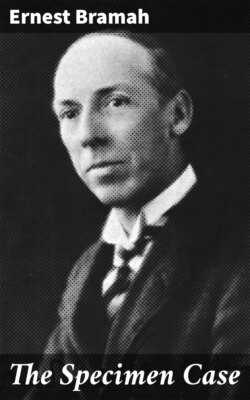Читать книгу The Specimen Case - Bramah Ernest - Страница 4
На сайте Литреса книга снята с продажи.
* * *
ОглавлениеTable of Contents
THERE is, you will (I hope) notice, a certain system in the arrangement of this book of stories. It is not—if an author may speak more than very casually of his own work without indelicacy—intended essentially as a collection of quite the best stories I might perhaps have chosen, nor is it, I am more than sure, a collection of anything like the worst that were available; it consists rather of a suitable example taken at convenient intervals over the whole time that I have been engaged in writing stories—a span of thirty years. In every case, therefore, the date at which the tale was written is attached—the place of writing being added merely, in the words of Mr. Finch McComas, "to round off the sentence." Each tale thus becomes a sort of milestone by which, should you happen to maintain so much interest, you can estimate your author's progress—backwards or forwards, as you may decide.
When the suggestion of this collection first arose there had already been published two volumes of what are now generally referred to as "Kai Lung" stories, and another pair of what might with more propriety be described as "Max Carrados" tales. There being no lack of other material available it seemed fitting that in this instance all stories of those two distinctive classes should be ruled out, and no doubt this would have been the plan had not, about that time, the Mystery arisen.
It is a little difficult, as the hand holds the pen, to appreciate a Mystery in relation to oneself. The nearest parallel that occurs is the case of the dentist (as described in Punch) who administered gas to himself preparatory to extracting one of his own teeth. Being intimately concerned, but quite unconscious of what is going on, I am therefore driven to contemporary record. So far as I have any evidence, Mr. Edward Shanks was the first to use the fatal word. Referring to The Wallet of Kai Lung, he would seem to have written: "Its name was therefore passed from mouth to mouth in a mysterious way, but few people had ever seen it or knew what it was like."
If this is indeed the fount and origin of the legend the historic reference may be proved in the Queen of December the 2nd, 1922. It sounds harmless enough, and in any case I take the opportunity of publicly forgiving Mr. Shanks whatever may result, but Dark Forces were evidently at work, for a few weeks later Mr. Grant Richards found it necessary (in the Times Literary Supplement) to declare: "Meanwhile I am asked all sorts of questions about the book and its author. Is there really such a person as Ernest Bramah? and so on."
The "so on" has a pleasantly speculative ring—to me, that is to say. At all events, whatever Mr. Richards had been asked, his diplomatic reference answered nothing, so that, later, he is induced to state without reserve: "Finally, I do assure his readers that such a person as Ernest Bramah does really and truly exist. I have seen and touched him." This should settle the matter, you would say? Not a bit of it. Turn to "N. G. R.-S." in the Westminster Gazette: "He assures us that there is such a person as Ernest Bramah. Well, there may be! I myself still believe..." (This break does not represent omitted matter, but "N. G. R.-S.'s" too-sinister-for-words private belief.) "Anyway, you can now buy The Wallet for seven-and-sixpence and form your own opinion of the reasons which keep the author of such a book so closely mysterious behind his unusual name."
And then, surely the most astonishing of all, there is Miss Rose Macaulay: Miss Macaulay the relentless precision, so flawlessly exact that she must by now hate the phrase "hard brilliance," author of Potterism (in whose dedication I have never ceased to cherish an ifinitesimal claim), retailing "They say" with the cheerful irresponsibility of a village gossip. "N. G. R.-S.", it will be seen, gilds the pill of innuendo with a compliment; Miss Macaulay administers a more salutary dose: "The crude, stilted, Conan Doyleish English of his detective stories certainly goes far to bear out the common theory that Mr. Bramah has a literary dual personality" (Nation and Athenaeum).
Finally (perhaps), to my hand as I write this Preface there comes a letter conveying the excogitation of an American publisher, representative of a firm which has already issued three books bearing my name. Casually, quite naturally, among other mundane business details, he drops the inspiring remark: "I have always had a feeling that you were a mythical person." So, in the language of a bygone age, that's that. After all, there is something not unattractive in the idea of being a mythical person...though from the heroic point of view one might have wished that it could have been "a mythological personage."...
Should the reader, still maintaining the intellectual curiosity which I have credited to him, here exclaim, "What is all this about and why?" I can only assure him that I have not the faintest notion. He and I are equally in the dark.
Apparently, there is no simple middle way, no sheltered, obvious path. Either I am to have no' existence, or I am to have decidedly too much: on the one hand banished into space as a mythical creation; on the other regarded askance' as the leader of a double (literary) life. But there is one retort still left whereby to confound the non-existers and the dualists alike—I can produce both a "Kai Lung" and a "Max Carrados" between one pair of covers, and here they are.
E. B.
London, 1924.
